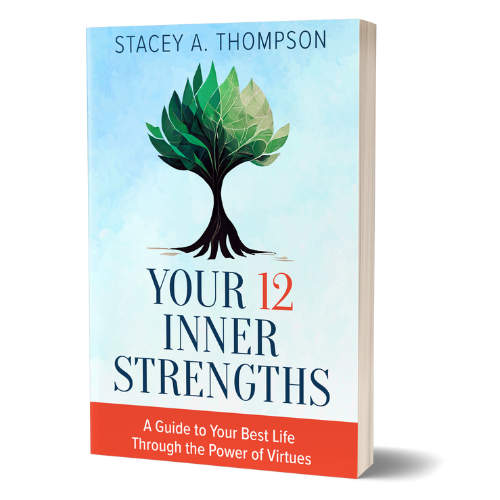
Enjoy this excerpt from the Gratitude chapter of Your 12 Inner Strengths, the new book by Stacey Thompson, founder of Virtues for Life.
Most of us know what makes us happy. It might be life’s big moments—getting married, having a baby, or buying a house. Or it could be simple pleasures, like getting lost in a good book, indulging in a creative hobby, taking walks in nature, enjoying a night out with friends, or giving back through volunteer work.
While the source of our happiness differs, we can agree that our happiness fluctuates. Monday morning comes around, and we drag ourselves back to a job we don’t like, or we’re suffering from a financial hardship, an illness, or a loss. When that happens, happiness plunges. But what if we could find happiness more consistently by recognizing the good around us, even amidst our difficulties?
In 1998, Robert A. Emmons, a leading gratitude science expert and psychology professor at the University of California, Davis, and Michael McCullough, a psychology professor at the University of Miami, conducted a pivotal study on the influence of gratitude on mental and physical health.
The psychologists assigned three randomly chosen groups to write in a journal weekly. The first group listed five things they were grateful for, the second noted five hassles or annoyances, and the third, a control group, recorded five events without any emotional emphasis.
They assessed participants’ mood, physical health, and life satisfaction before and after journaling to measure the true impact of gratitude.
After 10 weeks, the psychologists’ study revealed that participants who had written down what they were grateful for each week were 25 percent happier than the other two groups. They felt more optimistic and better about life overall. They also exercised more and were healthier.6
But even with gratitude’s proven benefits on our well-being, our problems can still overshadow our ability to feel thankful. George Bailey (Jimmy Stewart) vividly illustrates this struggle in the 1946 classic film It’s a Wonderful Life. George, a small-town building and loan manager at his father’s bank, has the respect of his community and always looks after his family and friends.
One snowy Christmas Eve, his Uncle Billy (Thomas Mitchell) accidentally gives $8,000 of the bank’s shareholders’ money to Mr. Potter (Lionel Barrymore), a greedy local banker who keeps the money. George faces possible financial ruin because of the mistake and falls into despair. He fears he’s worth more dead than alive.
As George prepares to jump from a bridge into icy water, an endearing guardian angel, Clarence (Henry Travers), pretends to drown himself, prompting George to save him.
While they both warm up in the tollhouse, George tells Clarence he wishes he had never been born. Clarence grants him his wish.
Taking a journey through time, George sees how different people’s lives would have been if he had never existed. For example, without George, Mr. Potter turns the town into a bleak place filled with saloons and nightclubs.
What’s more, George’s brother, Harry, drowns in a frozen lake as a child because George was not there to save him. As a result, Harry never grows up to become the hero who saves the lives of many soldiers during World War II.
Realizing the true value of his life, George begs Clarence to return him to it, which Clarence does. Grateful for his flawed house, the love of family and friends, and the townspeople’s support, George rejoices in his wonderful life!7
George Bailey’s renewed faith and awareness of life’s abundance reveal the remarkable potential of gratitude to transform our mindset, from negativity and despair to hope and possibility. Beyond the uplift in spirit as seen in George’s story, gratitude also provides these psychological and health benefits:8
Gratitude improves health: Research shows that gratitude can lead to healthier blood pressure and heart rate. It also strengthens the immune system, reduces aches and pains, and improves the quality and duration of sleep.
-
- Gratitude is a social superpower: When we are grateful, we naturally become more helpful, generous, and compassionate. Gratitude also fosters forgiveness and connection, reducing feelings of isolation and loneliness.
- Grateful people handle stress better: With a thankful disposition, we recover more quickly from trauma, adversity, and suffering.
- Gratitude boosts workplace productivity: Employees are over 50 percent more productive when they receive a simple “Thank you!” from a supervisor. In fact, 81 percent of people say they would work harder for a boss who shows appreciation. One of the top reasons people leave their jobs is because they don’t feel appreciated.
With such compelling evidence of gratitude’s benefits, practicing it is not just a nice idea but a worthwhile pursuit—even a life-changing one!

If you’d like to dive deeper into the twelve virtues that help you create your best life, this excerpt is from
Your 12 Inner Strengths: A Guide to Your Best Life Through the Power of Virtues by Stacey Thompson.
You can purchase the paperback or ebook on Amazon.
Also available through other online retailers.






Leave a Reply